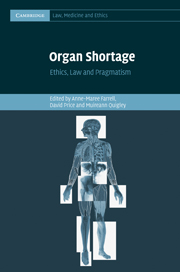Book contents
- Frontmatter
- Contents
- List of figures
- List of tables
- Contributors
- Acknowledgements
- List of abbreviations
- Table of cases
- Table of legislation
- Part I Setting the scene
- Part II Current issues affecting organ shortage
- Part III Strategies for addressing organ shortage
- 6 Incentivising organ donation
- 7 Making the margins mainstream: strategies to maximise the donor pool
- 8 The allocation of organs: the need for fairness and transparency
- 9 Ante-mortem issues affecting deceased donation: an ethico-legal perspective
- Part IV Comparative perspectives
- Part V Current reform and future challenges
- Bibliography
- Index
8 - The allocation of organs: the need for fairness and transparency
from Part III - Strategies for addressing organ shortage
Published online by Cambridge University Press: 29 March 2011
- Frontmatter
- Contents
- List of figures
- List of tables
- Contributors
- Acknowledgements
- List of abbreviations
- Table of cases
- Table of legislation
- Part I Setting the scene
- Part II Current issues affecting organ shortage
- Part III Strategies for addressing organ shortage
- 6 Incentivising organ donation
- 7 Making the margins mainstream: strategies to maximise the donor pool
- 8 The allocation of organs: the need for fairness and transparency
- 9 Ante-mortem issues affecting deceased donation: an ethico-legal perspective
- Part IV Comparative perspectives
- Part V Current reform and future challenges
- Bibliography
- Index
Summary
Whilst every opportunity must be taken to increase organ donation within accepted legal, moral and ethical guidelines, it is equally important that no effort is spared to avoid wastage. This process demands the highest standards, if public and professional confidence is to be maintained. Donated organs should be placed where they are most likely to improve quality of life and to be of lasting benefit.
This chapter considers the evolution of the organ allocation system in the United Kingdom (UK). As it has evolved, the system has incorporated many of the conflicts which can arise. These include (but are by no means limited to) conflicts over biological incompatibility between a donor and a recipient, legal issues, ethical principles, competing claims between individuals and between individuals and society, the objectives of healthcare regulators, and financial resources. The system of donation for thoracic organs and livers is not discussed in this chapter. Nor is there examination of the criteria for gaining access to the transplant list, an area which itself raises many issues worthy of consideration. This chapter will instead focus on the allocation of kidneys to those on kidney transplant lists. There are certain background conditions against which any analysis of the organ allocation system must take place. These are: 1. biological compatibility is important to avoid immediate failure; and 2. demand for organs currently outstrips available supply of organs.
- Type
- Chapter
- Information
- Organ ShortageEthics, Law and Pragmatism, pp. 122 - 135Publisher: Cambridge University PressPrint publication year: 2011



